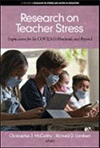
Research on Teacher Stress
Implications for the COVID-19 Pandemic and Beyond
Edited by:
Christopher J. McCarthy, University of Texas at Austin
Richard G. Lambert, University of North Carolina at Charlotte
A volume in the series: Research on Stress and Coping in Education. Editor(s): Christopher J. McCarthy, University of Texas at Austin. Richard G. Lambert, University of North Carolina at Charlotte.
Published 2023
This volume informs our understanding of how educational settings can respond to the challenges of the COVID-19 pandemic and beyond. Teaching has always been a challenging profession but the pandemic has added unprecedented levels of demands. Much of what we know about stress and trauma in education predates the COVID-19 pandemic.
As the pandemic recedes, it seems likely that recruiting and retaining teachers, always a challenge, will become even more difficult. This could not be worse for students, who face steep losses in their academic and socio-emotional progress after more than two years of pandemic-impacted schooling. The silver lining is that scholars who study the occupational health have spent the past several years studying the effect of the pandemic on teachers, which led us to edit this volume to collected what is known and have these experts explain how we can better support teachers in the future.
This book documents the many impacts of the pandemic on the teaching profession, but also leverages research to chart a path forward. Part I examines the contours of stress, with a particular emphasis on COVID-19 impacts. These contributions range from parents’ achievement worries to compassion fatigue, and, more optimistically, how teachers cope. Part II examines pandemic impacts on pre-school teachers, in both the U.S. and in Australia. Given the social distancing in place during the pandemic, pre-school students and their teachers were under unique demands, as there is no substitute for the personal connection critical at that age. It is likely that students entering elementary school in the next few years will have work to do in their social skills. Part III focuses on mentoring and stress during the pandemic. Mentoring is an important part of teacher’s professional development, but the pandemic scrambled traditional forms of mentoring as all teachers were thrown into unfamiliar online technology. The final section of this book, Part IV, includes links between teacher stress and trauma during the pandemic. Clearly, with the ongoing nature of the pandemic, it is easy to see how trauma is likely to manifest in years to come.
Readers of this book will better understand teacher demands, as well as the resources teachers will need going forward. Teachers made heroic efforts during the pandemic to help their students both academically and personally. We owe to them to learn from research during the pandemic that points to the way to a healthier occupational future.
CONTENTS
Introduction—Teacher Stress and Coping During the Pandemic: What Can We Learn and How Can We Move Forward? Christopher J. McCarthy and Richard G. Lambert. Acknowledgments. PART I: EXAMINING THE CONTOURS OF STRESS AND COPING IN EDUCATION. Linking Parents’ Achievement Worries to Children’s Felt Pressure and Poor Scholastic Performance, Ann-Kathrin Hirschauer, Miguel Kazén, and Julius Kuhl. Bearing Witness: A Phenomenological Study on Teacher Compassion Fatigue and Coping in Southern California During COVID-19, Rebecca S. Levine, Amy Vatne Bintliff, and Caren Holtzman. Proactive Coping and Teacher Stress Vulnerability in High-Stress Teaching Contexts, Rachel E. Gaines, Christopher J. McCarthy, and Sally Lineback. PART II: COVID-19 STRESS AMONG EARLY CHILDHOOD EDUCATORS. Teacher Stress During the COVID-19 Pandemic: An Examination of North Carolina Early Childhood Educators, Richard G. Lambert, Archana V. Hegde, T. Scott Holcomb, Bryndle Bottoms, Kayla Geistman, and Taylor Brown. COVID-19 Has Made a Grave Situation Worse: Depression Symptoms Among Early Childhood Teachers, Nail Hassairi, Gail E. Joseph, Heather Cook, Janet S. Soderberg, Juliet Taylor, Linghui Chu, Maria C. Limlingan, and Anran Ouyang. Early Childhood Educators’ Experiences During an Australian COVID-19 Lockdown, Rebecca. A. Thomas and Emily Berger. PART III: MENTORING TO SUPPORT PRE-SERVICE AND EARLY CAREER TEACHERS DURING COVID-19. Examining the Mentor–Mentee Dyad to Understand the Role of Early Career Teacher Stress Created by COVID-19, Sonya Haidusek-Niazy and Rob E. Carpenter. First-Year Teachers Seek Mentoring and Stress Management During a Pandemic, Sharon Daley, Tammi Davis, Jackie Sydnor, and Margaret Ascolani. PART IV: CONNECTIONS BETWEEN EDUCATOR STRESS AND TRAUMA DURING COVID-19. Examining Elementary Educators’ Awareness and Perceptions of Trauma-Informed Teaching Approaches, Lucy T. Callicott and Katherine Baker. At Risk of Trauma: The Exacerbation of Teacher Stress During the COVID-19 Pandemic, Helen H. Min and Patricia A. Jennings. Evaluation of a Teacher Stress Reduction Group During a Pandemic, Maytal Eyal, Cassandra A. Gearhart, Kristen C. Mosley, and Christopher J. McCarthy. It’s Just About Helping Them Feel Safe: Exploring The Impact of a Trauma-Informed Care Group for Pre-Service Teachers, Travis D. Bauer and Christopher J. McCarthy. Teacher Stress During the Pandemic: What Have We Learned and How Can We Move Forward? Richard G. Lambert and Christopher McCarthy.
-
Paperback979-8-88730-213-3
Web price: $45.04 (Reg. 52.99)
-
Hardcover979-8-88730-214-0
Web price: $80.74 (Reg. 94.99)
- eBook979-8-88730-215-7

- EDU038000 - EDUCATION: Student Life & Student Affairs
- EDU046000 - EDUCATION: Professional Development
- EDU045000 - EDUCATION: COUNSELING: Crisis Management
-
 Emerging Thought and Research on Student, Teacher, and Administrator Stress and Coping
Emerging Thought and Research on Student, Teacher, and Administrator Stress and Coping
-
 Higher Education for the People
Critical Contemplative Methods of Liberatory Practice
Higher Education for the People
Critical Contemplative Methods of Liberatory Practice
-
 International Perspectives on Teacher Stress
International Perspectives on Teacher Stress
-
 Mindfulness for Educational Practice
A Path to Resilience for Challenging Work
Mindfulness for Educational Practice
A Path to Resilience for Challenging Work
-
 Personality, Stress, and Coping
Implications for Education
Personality, Stress, and Coping
Implications for Education
-
 Stress and Coping of English Learners
Stress and Coping of English Learners
-
 Toward a Broader Understanding of Stress and Coping
Mixed Methods Approaches
Toward a Broader Understanding of Stress and Coping
Mixed Methods Approaches

